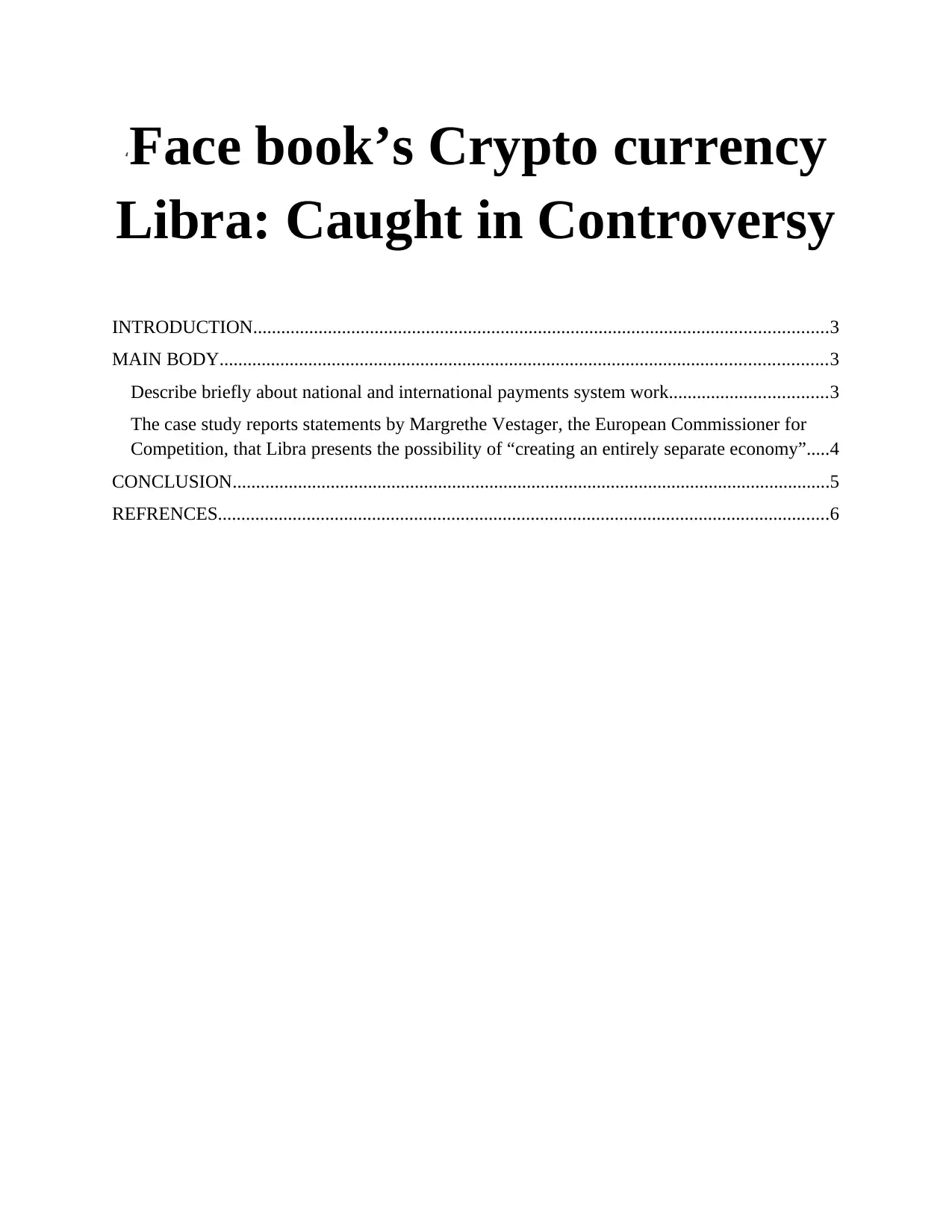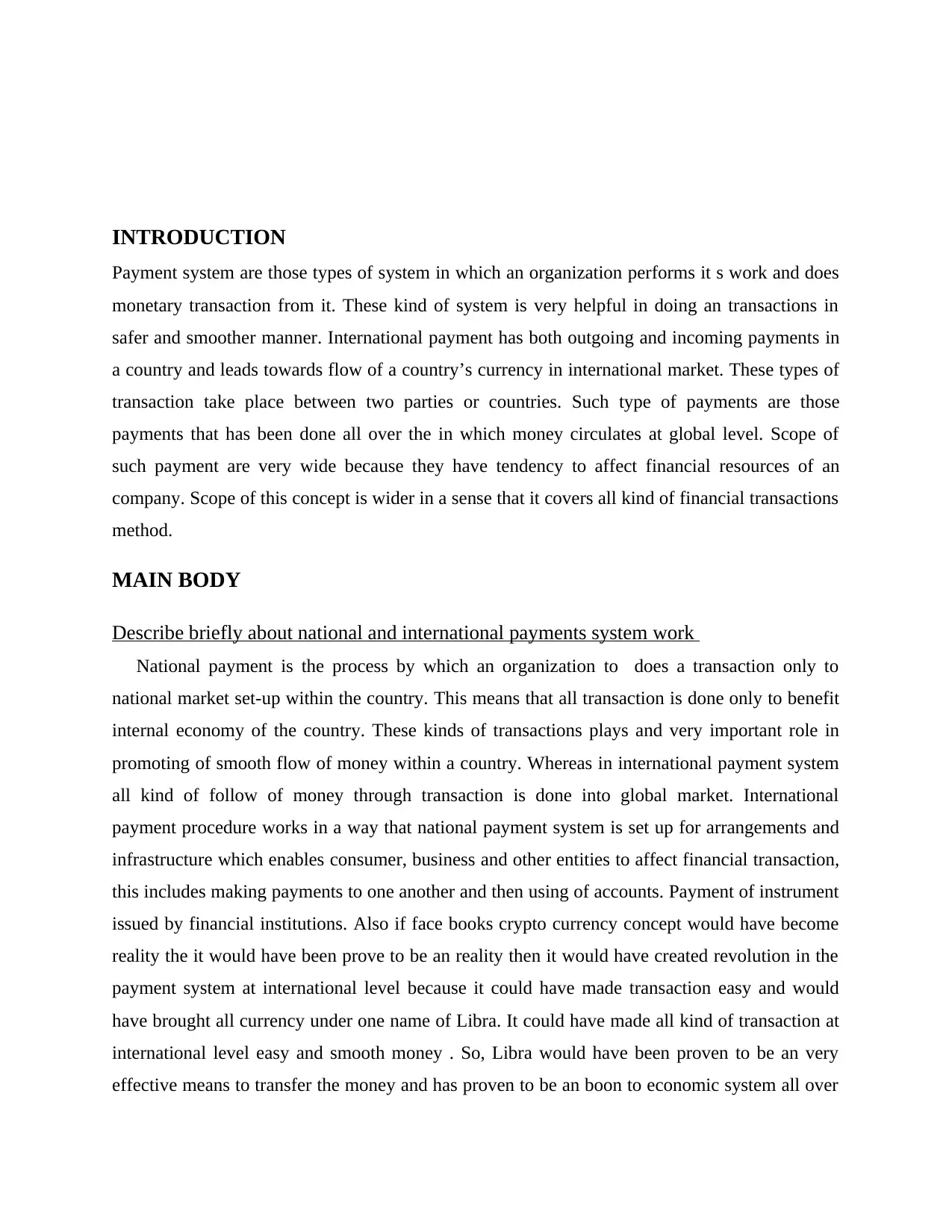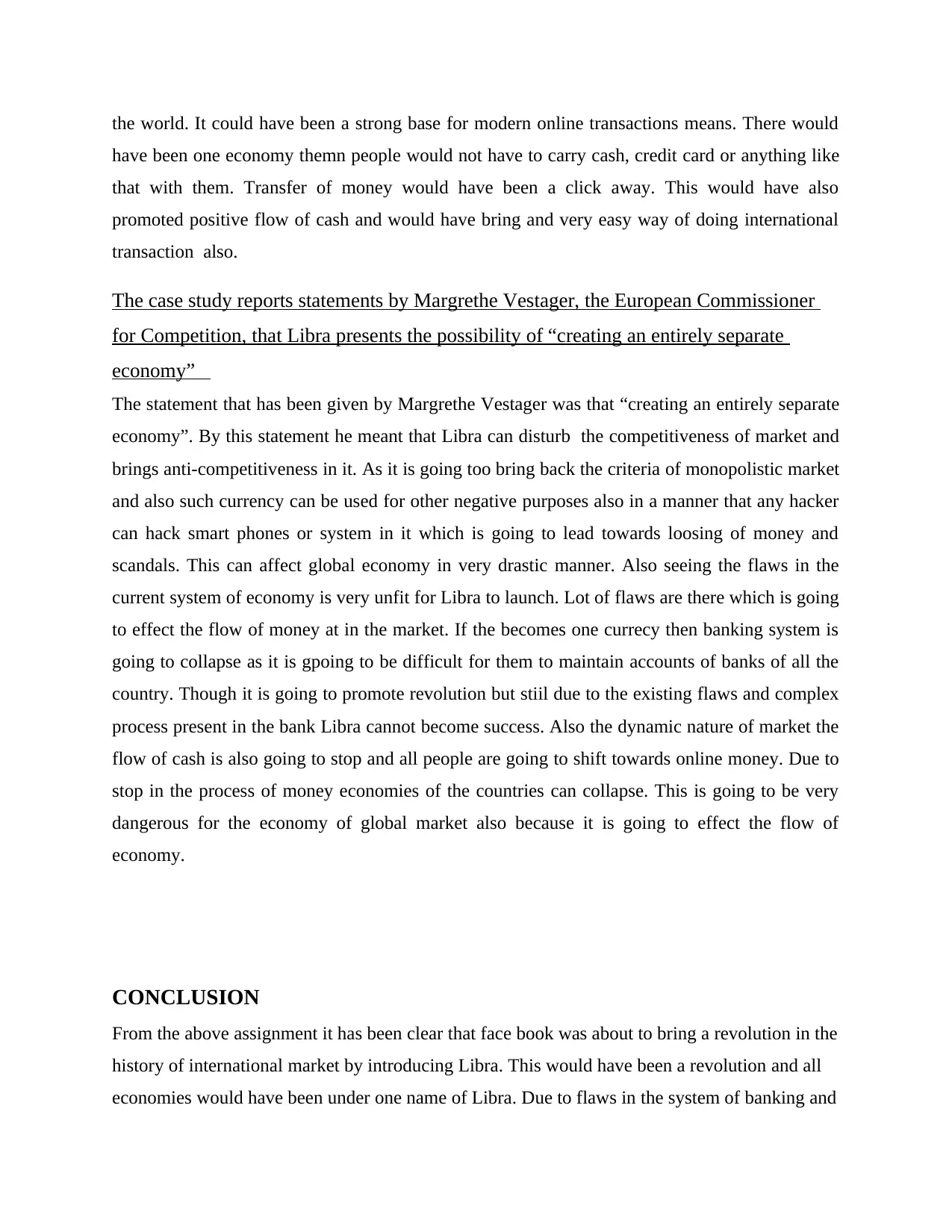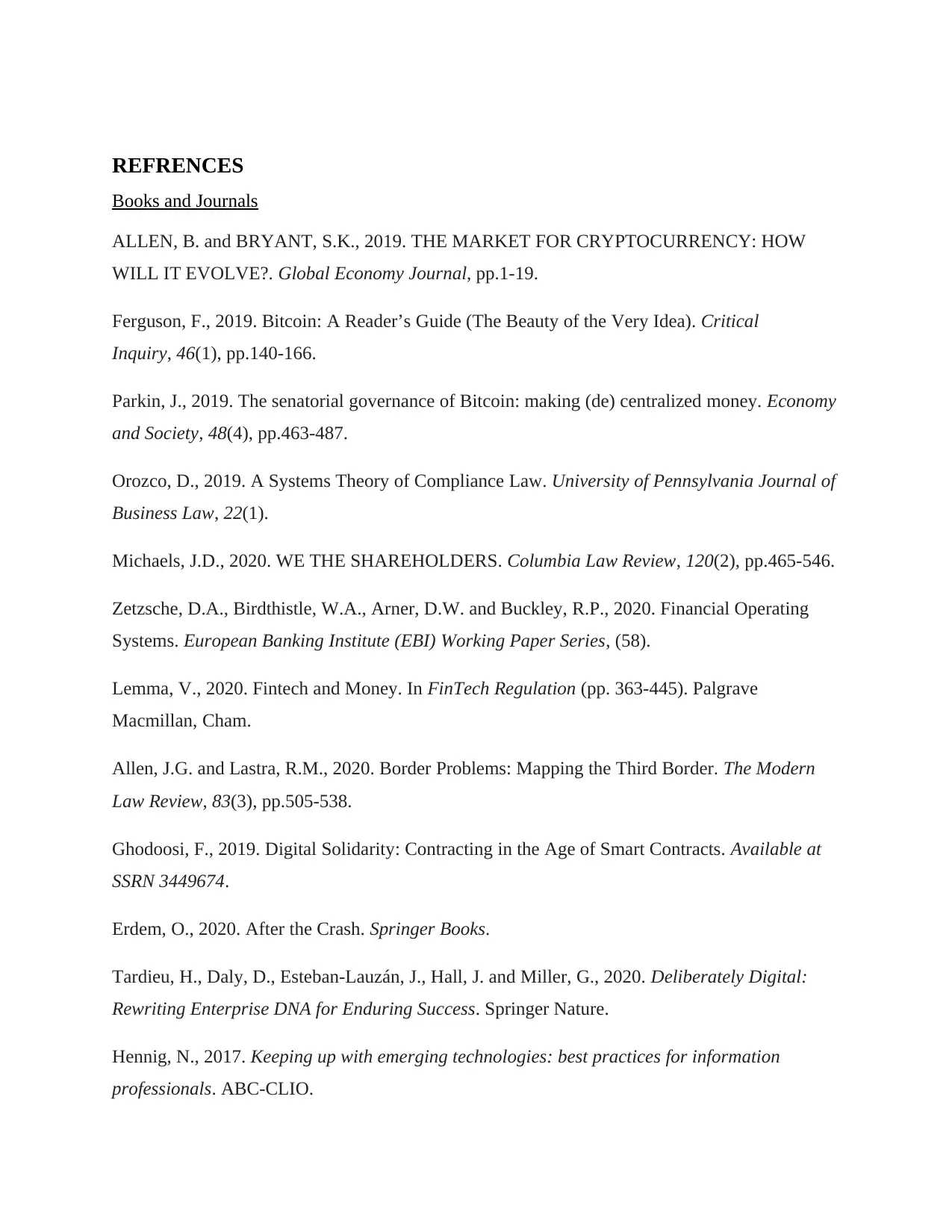Facebook's Libra and the Future of Payment Systems Case Study
VerifiedAdded on 2023/01/11
|5
|1241
|39
Case Study
AI Summary
This assignment analyzes the Facebook Libra cryptocurrency case study, focusing on its potential impact on national and international payment systems. It examines the existing payment infrastructures, including key objects of exchange, agents, structures, and calculative devices, and assesses how Libra could have disrupted these systems. The assignment also explores the European Commissioner for Competition's concerns about Libra potentially creating a separate economy, critically evaluating whether the ties between actors in this new financial ecosystem would mirror those in the existing banking system or align with Bitcoin's vision of a peer-to-peer electronic cash system. The analysis considers the implications of Libra's introduction, including its effects on market competitiveness, banking systems, and the flow of money in the global economy, drawing on relevant literature to support its arguments. The assignment highlights the controversies and challenges associated with Libra's proposed launch, including the potential for market disruption and the need for regulatory oversight.

‘Face book’s Crypto currency
Libra: Caught in Controversy
INTRODUCTION...........................................................................................................................3
MAIN BODY..................................................................................................................................3
Describe briefly about national and international payments system work..................................3
The case study reports statements by Margrethe Vestager, the European Commissioner for
Competition, that Libra presents the possibility of “creating an entirely separate economy”.....4
CONCLUSION................................................................................................................................5
REFRENCES...................................................................................................................................6
Libra: Caught in Controversy
INTRODUCTION...........................................................................................................................3
MAIN BODY..................................................................................................................................3
Describe briefly about national and international payments system work..................................3
The case study reports statements by Margrethe Vestager, the European Commissioner for
Competition, that Libra presents the possibility of “creating an entirely separate economy”.....4
CONCLUSION................................................................................................................................5
REFRENCES...................................................................................................................................6
Paraphrase This Document
Need a fresh take? Get an instant paraphrase of this document with our AI Paraphraser

INTRODUCTION
Payment system are those types of system in which an organization performs it s work and does
monetary transaction from it. These kind of system is very helpful in doing an transactions in
safer and smoother manner. International payment has both outgoing and incoming payments in
a country and leads towards flow of a country’s currency in international market. These types of
transaction take place between two parties or countries. Such type of payments are those
payments that has been done all over the in which money circulates at global level. Scope of
such payment are very wide because they have tendency to affect financial resources of an
company. Scope of this concept is wider in a sense that it covers all kind of financial transactions
method.
MAIN BODY
Describe briefly about national and international payments system work
National payment is the process by which an organization to does a transaction only to
national market set-up within the country. This means that all transaction is done only to benefit
internal economy of the country. These kinds of transactions plays and very important role in
promoting of smooth flow of money within a country. Whereas in international payment system
all kind of follow of money through transaction is done into global market. International
payment procedure works in a way that national payment system is set up for arrangements and
infrastructure which enables consumer, business and other entities to affect financial transaction,
this includes making payments to one another and then using of accounts. Payment of instrument
issued by financial institutions. Also if face books crypto currency concept would have become
reality the it would have been prove to be an reality then it would have created revolution in the
payment system at international level because it could have made transaction easy and would
have brought all currency under one name of Libra. It could have made all kind of transaction at
international level easy and smooth money . So, Libra would have been proven to be an very
effective means to transfer the money and has proven to be an boon to economic system all over
Payment system are those types of system in which an organization performs it s work and does
monetary transaction from it. These kind of system is very helpful in doing an transactions in
safer and smoother manner. International payment has both outgoing and incoming payments in
a country and leads towards flow of a country’s currency in international market. These types of
transaction take place between two parties or countries. Such type of payments are those
payments that has been done all over the in which money circulates at global level. Scope of
such payment are very wide because they have tendency to affect financial resources of an
company. Scope of this concept is wider in a sense that it covers all kind of financial transactions
method.
MAIN BODY
Describe briefly about national and international payments system work
National payment is the process by which an organization to does a transaction only to
national market set-up within the country. This means that all transaction is done only to benefit
internal economy of the country. These kinds of transactions plays and very important role in
promoting of smooth flow of money within a country. Whereas in international payment system
all kind of follow of money through transaction is done into global market. International
payment procedure works in a way that national payment system is set up for arrangements and
infrastructure which enables consumer, business and other entities to affect financial transaction,
this includes making payments to one another and then using of accounts. Payment of instrument
issued by financial institutions. Also if face books crypto currency concept would have become
reality the it would have been prove to be an reality then it would have created revolution in the
payment system at international level because it could have made transaction easy and would
have brought all currency under one name of Libra. It could have made all kind of transaction at
international level easy and smooth money . So, Libra would have been proven to be an very
effective means to transfer the money and has proven to be an boon to economic system all over

the world. It could have been a strong base for modern online transactions means. There would
have been one economy themn people would not have to carry cash, credit card or anything like
that with them. Transfer of money would have been a click away. This would have also
promoted positive flow of cash and would have bring and very easy way of doing international
transaction also.
The case study reports statements by Margrethe Vestager, the European Commissioner
for Competition, that Libra presents the possibility of “creating an entirely separate
economy”
The statement that has been given by Margrethe Vestager was that “creating an entirely separate
economy”. By this statement he meant that Libra can disturb the competitiveness of market and
brings anti-competitiveness in it. As it is going too bring back the criteria of monopolistic market
and also such currency can be used for other negative purposes also in a manner that any hacker
can hack smart phones or system in it which is going to lead towards loosing of money and
scandals. This can affect global economy in very drastic manner. Also seeing the flaws in the
current system of economy is very unfit for Libra to launch. Lot of flaws are there which is going
to effect the flow of money at in the market. If the becomes one currecy then banking system is
going to collapse as it is gpoing to be difficult for them to maintain accounts of banks of all the
country. Though it is going to promote revolution but stiil due to the existing flaws and complex
process present in the bank Libra cannot become success. Also the dynamic nature of market the
flow of cash is also going to stop and all people are going to shift towards online money. Due to
stop in the process of money economies of the countries can collapse. This is going to be very
dangerous for the economy of global market also because it is going to effect the flow of
economy.
CONCLUSION
From the above assignment it has been clear that face book was about to bring a revolution in the
history of international market by introducing Libra. This would have been a revolution and all
economies would have been under one name of Libra. Due to flaws in the system of banking and
have been one economy themn people would not have to carry cash, credit card or anything like
that with them. Transfer of money would have been a click away. This would have also
promoted positive flow of cash and would have bring and very easy way of doing international
transaction also.
The case study reports statements by Margrethe Vestager, the European Commissioner
for Competition, that Libra presents the possibility of “creating an entirely separate
economy”
The statement that has been given by Margrethe Vestager was that “creating an entirely separate
economy”. By this statement he meant that Libra can disturb the competitiveness of market and
brings anti-competitiveness in it. As it is going too bring back the criteria of monopolistic market
and also such currency can be used for other negative purposes also in a manner that any hacker
can hack smart phones or system in it which is going to lead towards loosing of money and
scandals. This can affect global economy in very drastic manner. Also seeing the flaws in the
current system of economy is very unfit for Libra to launch. Lot of flaws are there which is going
to effect the flow of money at in the market. If the becomes one currecy then banking system is
going to collapse as it is gpoing to be difficult for them to maintain accounts of banks of all the
country. Though it is going to promote revolution but stiil due to the existing flaws and complex
process present in the bank Libra cannot become success. Also the dynamic nature of market the
flow of cash is also going to stop and all people are going to shift towards online money. Due to
stop in the process of money economies of the countries can collapse. This is going to be very
dangerous for the economy of global market also because it is going to effect the flow of
economy.
CONCLUSION
From the above assignment it has been clear that face book was about to bring a revolution in the
history of international market by introducing Libra. This would have been a revolution and all
economies would have been under one name of Libra. Due to flaws in the system of banking and
⊘ This is a preview!⊘
Do you want full access?
Subscribe today to unlock all pages.

Trusted by 1+ million students worldwide

risk of losing financial stability of the country it was not introduced. Also it was said that this is
going to make the competitiveness of market go down. In this file ways of doing international
and national payment have been told with impact of Libra if introduced. Other question critical
evaluation of Libra done by European Commission has been explained.
going to make the competitiveness of market go down. In this file ways of doing international
and national payment have been told with impact of Libra if introduced. Other question critical
evaluation of Libra done by European Commission has been explained.
Paraphrase This Document
Need a fresh take? Get an instant paraphrase of this document with our AI Paraphraser

REFRENCES
Books and Journals
ALLEN, B. and BRYANT, S.K., 2019. THE MARKET FOR CRYPTOCURRENCY: HOW
WILL IT EVOLVE?. Global Economy Journal, pp.1-19.
Ferguson, F., 2019. Bitcoin: A Reader’s Guide (The Beauty of the Very Idea). Critical
Inquiry, 46(1), pp.140-166.
Parkin, J., 2019. The senatorial governance of Bitcoin: making (de) centralized money. Economy
and Society, 48(4), pp.463-487.
Orozco, D., 2019. A Systems Theory of Compliance Law. University of Pennsylvania Journal of
Business Law, 22(1).
Michaels, J.D., 2020. WE THE SHAREHOLDERS. Columbia Law Review, 120(2), pp.465-546.
Zetzsche, D.A., Birdthistle, W.A., Arner, D.W. and Buckley, R.P., 2020. Financial Operating
Systems. European Banking Institute (EBI) Working Paper Series, (58).
Lemma, V., 2020. Fintech and Money. In FinTech Regulation (pp. 363-445). Palgrave
Macmillan, Cham.
Allen, J.G. and Lastra, R.M., 2020. Border Problems: Mapping the Third Border. The Modern
Law Review, 83(3), pp.505-538.
Ghodoosi, F., 2019. Digital Solidarity: Contracting in the Age of Smart Contracts. Available at
SSRN 3449674.
Erdem, O., 2020. After the Crash. Springer Books.
Tardieu, H., Daly, D., Esteban-Lauzán, J., Hall, J. and Miller, G., 2020. Deliberately Digital:
Rewriting Enterprise DNA for Enduring Success. Springer Nature.
Hennig, N., 2017. Keeping up with emerging technologies: best practices for information
professionals. ABC-CLIO.
Books and Journals
ALLEN, B. and BRYANT, S.K., 2019. THE MARKET FOR CRYPTOCURRENCY: HOW
WILL IT EVOLVE?. Global Economy Journal, pp.1-19.
Ferguson, F., 2019. Bitcoin: A Reader’s Guide (The Beauty of the Very Idea). Critical
Inquiry, 46(1), pp.140-166.
Parkin, J., 2019. The senatorial governance of Bitcoin: making (de) centralized money. Economy
and Society, 48(4), pp.463-487.
Orozco, D., 2019. A Systems Theory of Compliance Law. University of Pennsylvania Journal of
Business Law, 22(1).
Michaels, J.D., 2020. WE THE SHAREHOLDERS. Columbia Law Review, 120(2), pp.465-546.
Zetzsche, D.A., Birdthistle, W.A., Arner, D.W. and Buckley, R.P., 2020. Financial Operating
Systems. European Banking Institute (EBI) Working Paper Series, (58).
Lemma, V., 2020. Fintech and Money. In FinTech Regulation (pp. 363-445). Palgrave
Macmillan, Cham.
Allen, J.G. and Lastra, R.M., 2020. Border Problems: Mapping the Third Border. The Modern
Law Review, 83(3), pp.505-538.
Ghodoosi, F., 2019. Digital Solidarity: Contracting in the Age of Smart Contracts. Available at
SSRN 3449674.
Erdem, O., 2020. After the Crash. Springer Books.
Tardieu, H., Daly, D., Esteban-Lauzán, J., Hall, J. and Miller, G., 2020. Deliberately Digital:
Rewriting Enterprise DNA for Enduring Success. Springer Nature.
Hennig, N., 2017. Keeping up with emerging technologies: best practices for information
professionals. ABC-CLIO.
1 out of 5
Related Documents
Your All-in-One AI-Powered Toolkit for Academic Success.
+13062052269
info@desklib.com
Available 24*7 on WhatsApp / Email
![[object Object]](/_next/static/media/star-bottom.7253800d.svg)
Unlock your academic potential
Copyright © 2020–2025 A2Z Services. All Rights Reserved. Developed and managed by ZUCOL.





